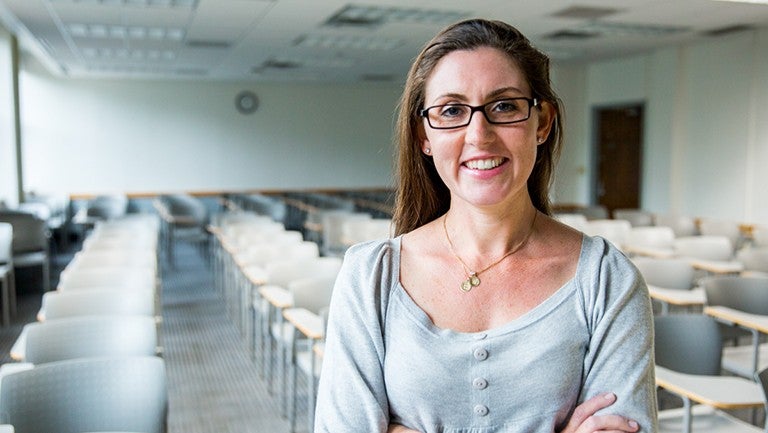
September 8, 2017–
Anna Johnson, an assistant professor of psychology, will lead the research on children in the much-lauded free pre-K system in Tulsa, Oklahoma. Deborah Phillips, a professor of psychology and Johnson’s colleague in the department, is a co-investigator on the research.
“There is strong evidence that shows pre-K programs can reduce early learning disparities and improve children’s readiness for kindergarten, especially for children who are low-income or have disabilities,” Johnson says. “The mystery is why pre-K benefits have been shown to fade out by second or third grade, yet older generation pre-school programs like Head Start have long-term positive impacts that include reductions in crime and higher earnings.”
Johnson will use the grant to research contemporary pre-K programs in Tulsa and examine what processes and practices in these classrooms most contribute to providing young children with enduring skills.
GEORGETOWN LEGACY
“Tulsa is a really good place to study this because it has a well-known public pre-K program and the public school system collaborates with the program,” Johnson says. “So it’s a whole landscape of publicly funded early intervention programs for young children to get them ready for school.”
Her research builds on the longitudinal research of the Tulsa program begun by University Professor William Gormley, who co-directs Georgetown’s Center for Research on Children in the United States (CROCUS) with Phillips. The two Georgetown professors have published numerous scholarly articles on the Tulsa program since 2001.
Last year, Phillips, Gormley and Sara Anderson, a non-resident senior fellow at CROCUS, published a paper in the peer-reviewed Developmental Psychology that found 4-year-olds who participated in the Tulsa program have higher math test scores, are less likely to be held back a grade and less likely to be chronically absent in middle school.
ACTIVE INGREDIENTS, SELF-REGULATION
“One of the secret active ingredients that Deborah and I think might be really important, that might explain why the Tulsa program has been so successful, is something the teachers are doing in the classroom to support the children’s self-regulation,” Johnson says. “So we’re focusing on children’s self-regulatory development.”
This is only one direction of Johnson’s research – she recently received a three-year Young Scholars grant from the Foundation for Child Development to study the well-being of pre-K teachers in the Tulsa program,understand what teachers do in the classroom and examine how teacher function might impact child development.
Johnson also recently published a paper in Child Development showing how young American children whose low-income households experience food insecurity face potentially lifelong learning disadvantages that begin with kindergarten.
AWARD-WINNING RESEARCH
A post-doctoral research fellow in Phillips’ lab before becoming an assistant professor at Georgetown in 2013, Johnson is the recipient of the prestigious 2016 Victoria S. Levin Grant for Early Career Success in Young Children’s Mental Health Research from the Society of Research in Child Development (SRCD).
SRCD presented her with its Early Career Research Contributions Award in 2015. Support for her work also has included grants from the Department of Health and Human Services for research on topics such as the effect of child-care subsidies on the long-term achievement of low-income children.
OUR NATION’S CHILDREN
“All my research focuses on vulnerable, low-income children within the first five years of life, ” explains Johnson, the mother of two children under the age of 5. “If we can find interventions and other solutions to problems for these kids in these crucial first years, we can help prepare them for success in both school and life for the long-term.”
Janet Mann, Georgetown’s vice provost for research and professor of biology and psychology, says, “We are so lucky to have her on our faculty.”
“We are incredibly proud of Professor Johnson’s accomplishments and dedication to mitigating the early learning disparities that plague our nation’s children.”